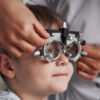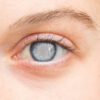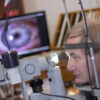Ophthalmologist – A Doctor (of Medicine) who specialises in the Eye
Ophthalmology is a sub-speciality of medicine that deals with the eye.
It can be split into further sub-specialities. E.g Cornea, Medical Retina, Glaucoma
Ophthalmologist can do surgery and register people as partially sighted or severely partially sighted.
Optometrist – A primary health care provider who deals with Eyes
Optometry is a degree course. To become an Optometrist you have to then complete one year in clinical placement and pass qualifying exams.
Optometrists should be your primary port of call for eye issues.
Historically known for spectacle prescriptions and fitting contact lenses, they are also trained in the detection and management of binocular vision issues and ocular diseases.
Over time Optometrists have taken on a larger role in the detection and management of ocular diseases and now with the appropriate post qualification certification such as Independent Prescribing they can treat and manage a lot of ocular conditions that historically would have required referral to an Ophthalmologist.
Optometrists also can sub-specialise into areas such as ocular disease, dry eye, speciality contact lenses, myopia management, paediatrics, binocular vision, behavioural optometry, sports vision.
Dispensing Optician – A person qualified to prescribe and dispense as well as to make glasses
Dispensing opticians can qualify by two routes, through a university degree or distance learning diploma. Either route takes 3 years of training and qualifying exams.
Only a GOC registered Dispensing Optician (or Optometrist) is legally allowed to dispense spectacles to under 16s or people with sight loss (without supervision) and modify an optometrists’ prescription for functionality. They are also allowed to dispense low vision aids to partially and severely partially sighted patients.
As well as helping you to choose spectacles, they can analyse your prescription and recommend lenses, tints and coatings for optimal visual performance.
Once qualified a Dispensing Optician and take on further study and train to fit contact lenses (Contact Lens Optician) or complete a bridging course to become an Optometrist.





